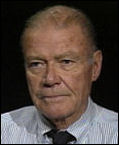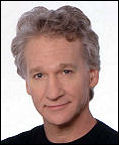There can be no question that by the force of his own voice and power, and particularly the influence he had upon President Lyndon Johnson, Defense Secretary Robert McNamara‘s advocacy of aggressive military tactics against the North Vietnamese and the Viet Cong in 1964, ’65, ’66 and ’67 directly resulted in God knows how many thousands of dead American soldiers.



(l. to r.) Robert McNamara, Bill Maher, Dick Cheney
It is just as certain that if McNamara had suddenly died or disappeared in early ’65, say, and under-Secretary of State George Ball, a strong opponent of hawkish Vietnam policies, had miraculously been appointed to take his place and Johnson had switched his allegiance to Ball and followed his advice, several thousand U.S. soldiers wouldn’t have died. It is reasonable to say that.
By the same token, if Vice-President Dick Cheney had been killed by that bomb in Iraq last week, a voice that has been pushing for some kind of military victory in Iraq since ’03 would have obviously been stilled, and perhaps fewer U.S. soldiers would bite the dust in the long run. It is reasonable to connect those two dots. It can therefore be said that Real Time talk-show host Bill Maher had a reasonable point when he expressed regret that Cheney wasn’t killed in Iraq last week.
Cheney has blood on his hands — American blood, Iraqi blood — that will never wash off, just as McNamara has thousands of ghosts of dead U.S. soldiers swirling around his person as we speak. The tragedy of all wars is that with the exception of leaders like Alexander the Great, they’re about ruthless old men sending relatively innocent young men off to their deaths. I think the idea of one of these old men getting his and perhaps fewer younger men getting killed as a result is a fairly good one.
Maher denied yesterday that he “advocates the whacking of our veep.” In a statement on the Huffington Post, he also said, “I don’t wish him dead.” A spokesman for Time Warner-owned HBO said, “The majority of people who watch this will know Bill wasn’t in support of the comments posted on the Huffington Post but rather was trying to be provocative by debating the limits of free speech.”









